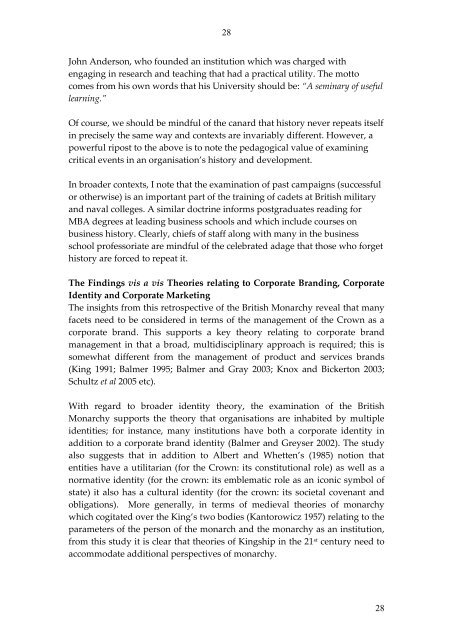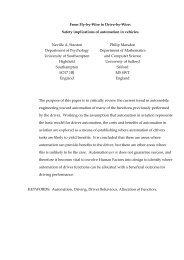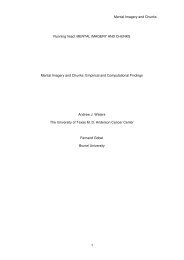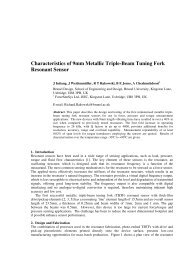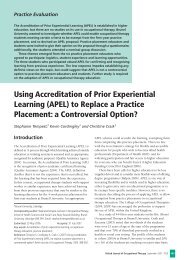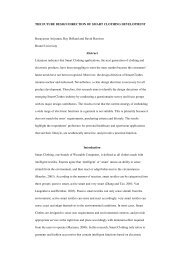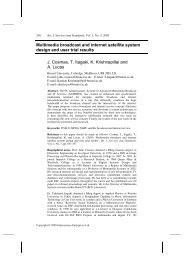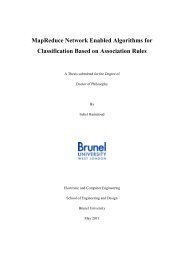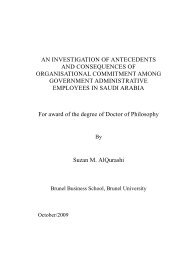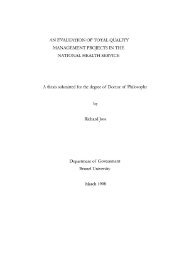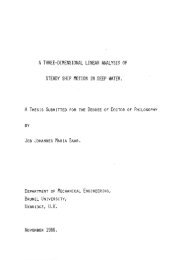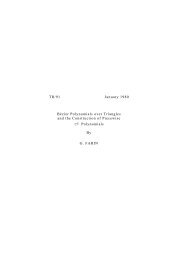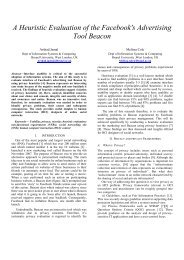insights from the british monarchy - BURA - Brunel University
insights from the british monarchy - BURA - Brunel University
insights from the british monarchy - BURA - Brunel University
Create successful ePaper yourself
Turn your PDF publications into a flip-book with our unique Google optimized e-Paper software.
28<br />
John Anderson, who founded an institution which was charged with<br />
engaging in research and teaching that had a practical utility. The motto<br />
comes <strong>from</strong> his own words that his <strong>University</strong> should be: ‚A seminary of useful<br />
learning.‛<br />
Of course, we should be mindful of <strong>the</strong> canard that history never repeats itself<br />
in precisely <strong>the</strong> same way and contexts are invariably different. However, a<br />
powerful ripost to <strong>the</strong> above is to note <strong>the</strong> pedagogical value of examining<br />
critical events in an organisation’s history and development.<br />
In broader contexts, I note that <strong>the</strong> examination of past campaigns (successful<br />
or o<strong>the</strong>rwise) is an important part of <strong>the</strong> training of cadets at British military<br />
and naval colleges. A similar doctrine informs postgraduates reading for<br />
MBA degrees at leading business schools and which include courses on<br />
business history. Clearly, chiefs of staff along with many in <strong>the</strong> business<br />
school professoriate are mindful of <strong>the</strong> celebrated adage that those who forget<br />
history are forced to repeat it.<br />
The Findings vis a vis Theories relating to Corporate Branding, Corporate<br />
Identity and Corporate Marketing<br />
The <strong>insights</strong> <strong>from</strong> this retrospective of <strong>the</strong> British Monarchy reveal that many<br />
facets need to be considered in terms of <strong>the</strong> management of <strong>the</strong> Crown as a<br />
corporate brand. This supports a key <strong>the</strong>ory relating to corporate brand<br />
management in that a broad, multidisciplinary approach is required; this is<br />
somewhat different <strong>from</strong> <strong>the</strong> management of product and services brands<br />
(King 1991; Balmer 1995; Balmer and Gray 2003; Knox and Bickerton 2003;<br />
Schultz et al 2005 etc).<br />
With regard to broader identity <strong>the</strong>ory, <strong>the</strong> examination of <strong>the</strong> British<br />
Monarchy supports <strong>the</strong> <strong>the</strong>ory that organisations are inhabited by multiple<br />
identities; for instance, many institutions have both a corporate identity in<br />
addition to a corporate brand identity (Balmer and Greyser 2002). The study<br />
also suggests that in addition to Albert and Whetten’s (1985) notion that<br />
entities have a utilitarian (for <strong>the</strong> Crown: its constitutional role) as well as a<br />
normative identity (for <strong>the</strong> crown: its emblematic role as an iconic symbol of<br />
state) it also has a cultural identity (for <strong>the</strong> crown: its societal covenant and<br />
obligations). More generally, in terms of medieval <strong>the</strong>ories of <strong>monarchy</strong><br />
which cogitated over <strong>the</strong> King’s two bodies (Kantorowicz 1957) relating to <strong>the</strong><br />
parameters of <strong>the</strong> person of <strong>the</strong> monarch and <strong>the</strong> <strong>monarchy</strong> as an institution,<br />
<strong>from</strong> this study it is clear that <strong>the</strong>ories of Kingship in <strong>the</strong> 21 st century need to<br />
accommodate additional perspectives of <strong>monarchy</strong>.<br />
28


